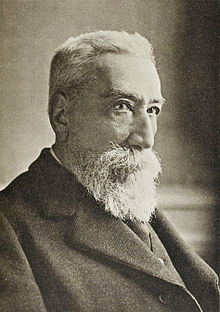อานาตอล ฟร็องส์
หน้าตา
อานาตอล ฟร็องส์ | |
|---|---|
 อานาตอล ฟร็องส์, ค.ศ. 1921 | |
| เกิด | 16 เมษายน ค.ศ. 1844 ปารีส, ฝรั่งเศส |
| เสียชีวิต | 12 ตุลาคม ค.ศ. 1924 ตูร์, ฝรั่งเศส |
| สัญชาติ | ชาวฝรั่งเศส |
| ชื่ออื่น | ฟร็องซัว-อานาตอล ตีโบ |
| อาชีพ | นักเขียนนวนิยาย |
| ตำแหน่ง | นักเขียน |
| รางวัล | รางวัลโนเบล ค.ศ. 1921 |
| นักเขียนชาวฝรั่งเศส | |
อานาตอล ฟร็องส์ (ฝรั่งเศส: Anatole France, ฟังเสียง; ชื่อเมื่อเกิด: ฟร็องซัว-อานาตอล ตีโบ - François-Anatole Thibault[1]; 16 เมษายน ค.ศ. 1844 - 12 ตุลาคม ค.ศ. 1924) อานาตอล ฟร็องส์เป็นนักเขียนนวนิยาย กวี และนักหนังสือพิมพ์คนสำคัญชาวฝรั่งเศส ผู้ได้รับรางวัลโนเบลสาขาวรรณกรรม ในปี ค.ศ. 1921
งานเขียน
[แก้]กวีนิพนธ์
[แก้]- Les Légions de Varus, poem published in 1867 in the Gazette rimée.
- Poèmes dorés (1873)
- Les Noces corinthiennes (The Bride of Corinth) (1876)
นวนิยาย
[แก้]- Jocaste et Le Chat maigre (Jocasta and the Famished Cat) (1879)
- Le Crime de Sylvestre Bonnard (The Crime of Sylvestre Bonnard) (1881)
- Les Désirs de Jean Servien (The Aspirations of Jean Servien) (1882)
- Abeille (Honey-Bee) (1883)
- Balthasar (1889)
- Thaïs (1890)
- L’Étui de nacre (Mother of Pearl) (1892)
- La Rôtisserie de la reine Pédauque (At the Sign of the Reine Pédauque) (1892)
- Les Opinions de Jérôme Coignard (The Opinions of Jerome Coignard) (1893)
- Le Lys rouge (The Red Lily) (1894)
- Le Jardin d’Épicure (The Garden of Epicurus) (1895)
- Le Puits de Sainte Claire (The Well of Saint Clare) (1895)
- L’Histoire contemporaine (A Chronicle of Our Own Times)
- 1: L’Orme du mail (The Elm-Tree on the Mall)(1897)
- 2: Le Mannequin d'osier (The Wicker Woman) (1897)
- 3: L’Anneau d'améthyste (The Amethyst Ring) (1899)
- 4: Monsieur Bergeret à Paris (Monsieur Bergeret in Paris) (1901)
- Clio (1900)
- Histoire comique (A Mummer's Tale) (1903)
- Sur la pierre blanche (The White Stone) (1905)
- L'Affaire Crainquebille (1901)
- L’Île des Pingouins (Penguin Island) (1908)
- Les Contes de Jacques Tournebroche (The Merrie Tales of Jacques Tournebroche) (1908)
- Les Sept Femmes de Barbe bleue et autres contes merveilleux (The Seven Wives Of Bluebeard and Other Marvellous Tales) (1909)
- Les dieux ont soif (The Gods Are Athirst) (1912)
- La Révolte des anges (The Revolt of the Angels) (1914)
อนุทิน
[แก้]- Le Livre de mon ami (My Friend's Book) (1885)
- Pierre Nozière (1899)
- Le Petit Pierre (Little Pierre) (1918)
- La Vie en fleur (The Bloom of Life) (1922)
บทละคร
[แก้]- Au petit bonheur (1898)
- Crainquebille (1903)
- La Comédie de celui qui épousa une femme muette (The Man Who Married A Dumb Wife) (1908)
- Le Mannequin d'osier (The Wicker Woman) (1928)
ชีวประวัติอิงประวัติศาสตร์
[แก้]- Vie de Jeanne d'Arc (The Life of Joan of Arc) (1908)
บทวิพากษ์วรรณกรรม
[แก้]- Alfred de Vigny (1869)
- Le Château de Vaux-le-Vicomte (1888)
- Le Génie latin (1913)
บทวิพากษ์สังคม
[แก้]- Opinions sociales (1902)
- Le Parti noir (1904)
- Vers les temps meilleurs (1906)
- Sur la voie glorieuse (1915)
- Trente ans de vie sociale, in four volumes, (1949, 1953, 1964, 1973)
คำกล่าวสำคัญ
[แก้]- "I prefer the folly of enthusiasm to the indifference of wisdom."
- "The law, in its majestic equality, forbids rich and poor alike to sleep under bridges, to beg in the streets, and to steal their bread." (Le Lys Rouge)
- "To accomplish great things, we must not only act but also dream, not only plan but also believe."
- "Irony is the gaiety of reflection and the joy of wisdom."
- "Wandering re-establishes the original harmony which once existed between man and the universe."
- "For every monarchy overthrown the sky becomes less brilliant, because it loses a star. A republic is ugliness set free."
- "She fought him off vigorously, scratched, cried that she will die before she submits, but the chevalier paid no attention to her words and took her. Afterwards, she smiled coyly and told him: "Do not think, dear chevalier, that you won me against my will. Better thank our good preacher who reminded me that we are mortal, and a pleasure missed today is missed forever. Now we can proceed, for I missed too many pleasures while being too prudent for my own good." (Fable by Anatole France.)
- "Nine tenths of education is encouragement."
- "All religions breed crime." (Thaïs)
- "The people who have no weaknesses are terrible: there is no way of taking advantage of them." (The Crime of Sylvestre Bonnard)
- "It is human nature to think wisely and act in an absurd fashion."
- "The whole art of teaching is only the art of awakening the natural curiosity of young minds for the purpose of satisfying it afterwards."
- "Until one has loved an animal, a part of one's soul remains unawakened."
- "Stupidity is far more dangerous than evil, for evil takes a break from time to time, stupidity does not."
- "All changes, even the most longed for, have their melancholy; for what we leave behind us is part of ourselves; we must die to one life before we can enter another."
- "Of all sexual aberrations, chastity is the strangest."
- "We have never heard the devil's side of the story, God wrote all the book."
อ้างอิง
[แก้]หมวดหมู่:
- บุคคลที่เกิดในปี พ.ศ. 2387
- บุคคลที่เสียชีวิตในปี พ.ศ. 2467
- บุคคลจากปารีส
- นักเขียนชาวฝรั่งเศส
- นักเขียนนวนิยายชาวฝรั่งเศส
- กวีชาวฝรั่งเศส
- นักเขียนบทละครชาวฝรั่งเศส
- นักเขียนบทความชาวฝรั่งเศส
- บุคคลในคริสต์ศตวรรษที่ 19
- บุคคลในคริสต์ศตวรรษที่ 20
- ผู้ได้รับรางวัลโนเบลสาขาวรรณกรรม
- ชาวฝรั่งเศสผู้ได้รับรางวัลโนเบล
- บทความเกี่ยวกับ ชีวประวัติ ที่ยังไม่สมบูรณ์
